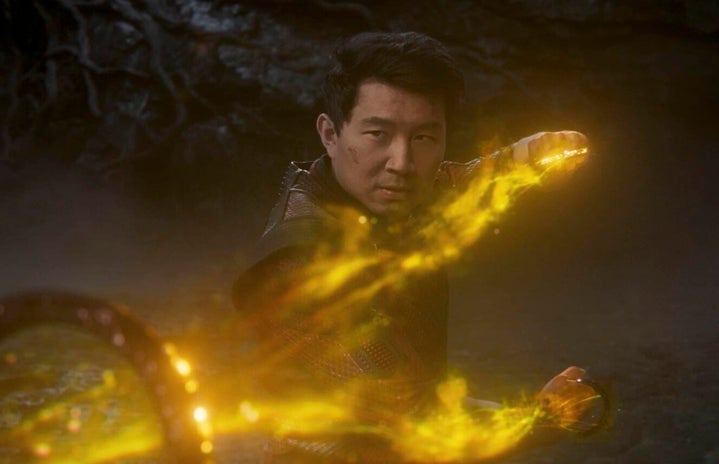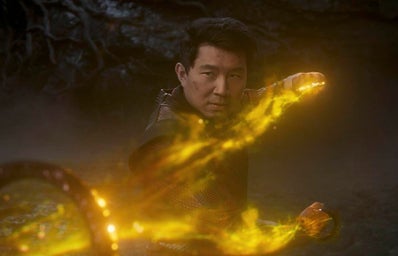Warning: Major spoilers ahead!
Shang-Chi and the Legend of the Ten Rings is the event of the year –– and rightfully so for its majority Asian-Chinese cast! This film tells the story of a son’s journey to confront his immortal tyrant father in order to save his family and home. Xu Shang-Chi, played by Simu Liu –– the charismatic, boy-next-door looking, Kim’s Convenience heart-throb –– is the first Asian superhero to grace our screens and everybody just can’t get enough of him.
In the thick of the celebrations for this “win” for Asian representation, it seems we’ve forgotten that he’s not the only Asian “superhero” captured here –– what about the amazing cast of Asian actresses? Fala Chen (who plays Shang-Chi’s mother, Ying Li), Meng’er Zhang (Shang-Chi’s sister, Wu Xialing) and Akwafina (Shang-Chi’s best friend, Katy) have joined the chat.
In fact, the critically acclaimed Marvel film features some pretty damn badass women who are integral to the story too. While I’m all for the inclusion of empowering female characters in Shang-Chi and the Legend of the Ten Rings, I can’t help but feel like in comparison to Shang-Chi, they’re shortchanged in their respective stories when it comes to their characters’ development. Considering that Asian women have never been key players in the Marvel cinematic universe, it’s important to unpack these narratives about them.
1. Mystical warrior turned housewife?
Right at the introduction, we see Ying Li (Fala Chen) masterfully commanding the elements of nature, truly serving us Katara from Legend of Aang vibes in a fight scene reminiscent of a Zhang Yi Mou film. Not only does she challenge the feared tyrant, Xu Wenwu (Tony Leung Chiu-wai), she uses his ten rings against him and throws him in a puddle like a discarded toy. How. Powerful. Despite presenting a character with so much potential, the mystic warrior, Ying Li, disappears into the shadows as Wen Wu’s lover and eventually into the figure of a sacrificial wife and mother.
What seems to be an unquestionable chemistry between the two is somehow enough to convince Ying Li to look past Wen Wu’s 1000 years of violent rampage to feed his hunger for power. Not only does she fall deeply in love with him, she leaves her home (the mystical realm of Ta Lo) and powers behind to start a family with him. She is eventually left vulnerable in the “outside” world and killed by a gang of thugs who were looking to exact revenge on Wen Wu for destroying their livelihoods before he “retired” into a family man. Talk about settling for less — she literally and figuratively gave up her life to be with this man. Ying Li’s character left so much more to be desired.
2. Xialing’s traumas are downplayed and unresolved
Shang-Chi’s sister, Xu Xialing, is a self-taught martial artist who started her own underground supernatural fight club at sixteen. Albeit being so much more skilled than her brother, he ends up getting the ten rings, he is celebrated and he remains the centre of focus, although the film is inherently a story about them both.
In her words, “If my dad wasn’t going to let me into his Empire, I was going to build my own.”
While a young Shang-Chi underwent harsh training under his father’s Ten Rings organisation to eventually take over his empire, Xialing was relegated to the shadows because girls had no place in the battlefield. She later ran away and carved out a respected reputation as a fierce fighter and business owner in the underworld. A decade later, their father’s hunt for them reunites the siblings in a fighting ring where Xialing beats Shang-Chi to a pulp –– this is the most of the resolution her character gets, in terms of childhood traumas.
I felt so frustrated watching her first interaction with her father after a decade amount to one where Shang-Chi does the speaking, while she is once again in the background. At the heart of the climax, when Wenwu passes his rings over to his son before his death, there is a beautiful scene between father and son with a certain sense of closure –– again, Xialing’s closure is peripheralised and disregarded. Granted, she gets to ride a cool dragon and fight off the soul eaters, but the film still truly did her dirty by setting up such a painful backstory and never allowing her to confront her father.
Of course, how can we forget the second post-credit scene where Xialing takes over her late father’s feared Ten Rings organisation and turns it into a squad of fierce female fighters. There is no denying the power of the scene where she is sitting on her father’s throne, in a blood red pants suit as she watches over her new battalion. It’s a shame because more than a statement, this feels like an opportunistic afterthought. Hopefully the next film will honour her story better because if this film has shown anything at all, it’s the fact that Xialing deserves her own spotlight!
3. Katy’s shallow character arc is disappointing
Katy is an unorthodox female supporting character in that she loves fast cars and is an immaculate driver, she’s not sexualised, she’s hilarious, and her obsession with Hotel California is an interesting plot device to cement her “American-ness” as an Asian. Despite her unique characteristics, her character arc whereby she miraculously develops excellent archery precision in the span of 3-days and successfully saves Shang-Chi from the nine-tailed monster, is incredibly unconvincing.
It would’ve helped if these convenient plot points were built up from the beginning of the film rather than randomly inserted towards the end. Katy’s character leaves a lot to be desired because we’ve yet to see her as her own character; rather, she is seen as Shang-Chi’s support system and a comic relief. She needs to develop her own agency through a carefully crafted backstory instead of being an “accidental superhero” in the Marvel cinematic universe.
Marvel films in general have made great strides in the arena of Asian female representation. However, there needs to be more space for its female characters to have thoughtful character arcs and reflections. To quote an article on Marvel’s “history of women problems” by The Daily Beast, “If you want to make a human being into a monster, deny them, at the cultural level, any reflection of themselves.” More than throwing in overtly intentional “empowerment” tropes, I think Shang-Chi could have afforded to be more critical in thinking about the growth of its female characters. I am not in any way downplaying the importance of this film and its wonderful slate of skilled Asian actresses. Rather, I’d like to see more regard for the purpose and journey of the complex female characters the film puts forth.


